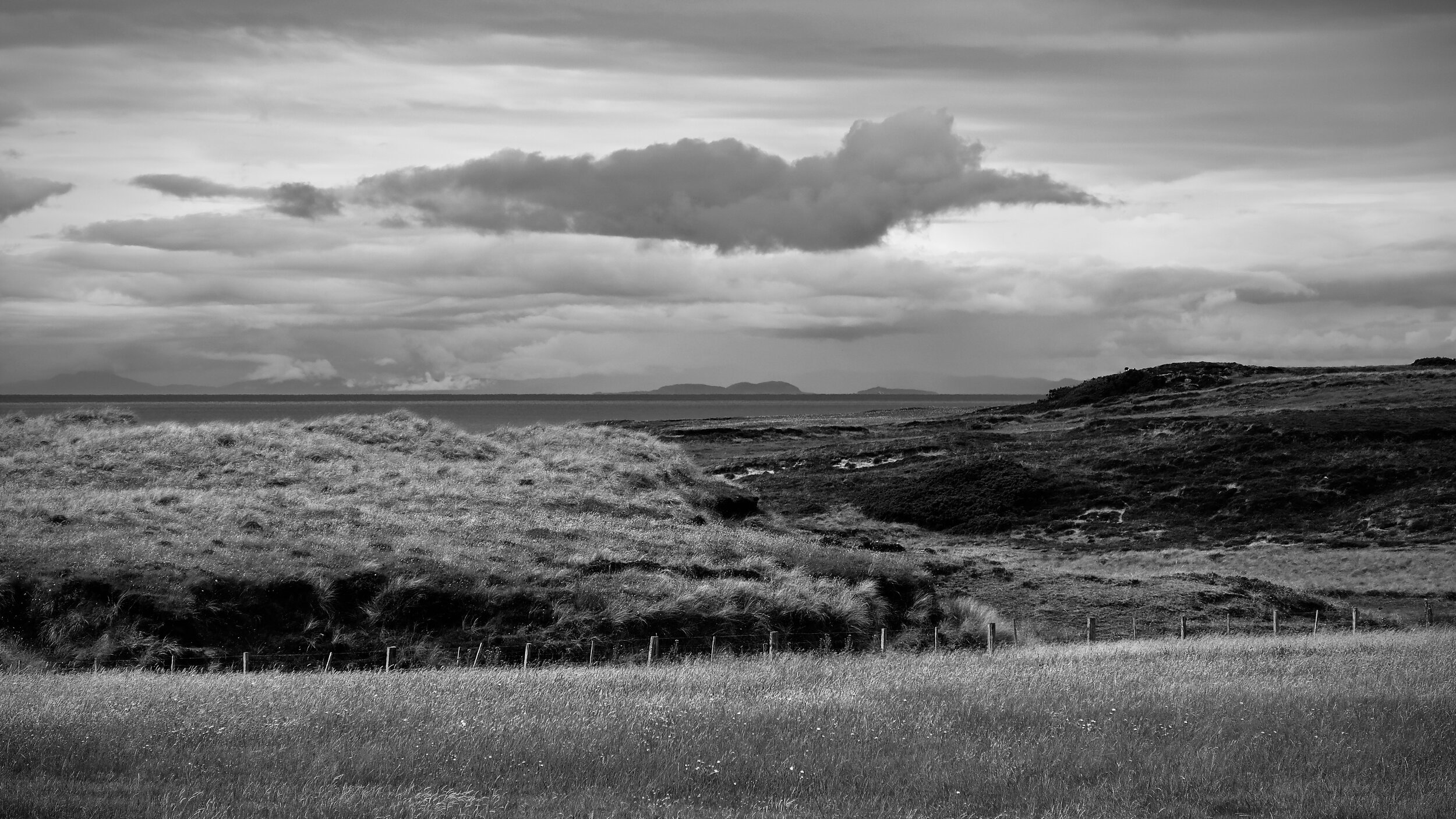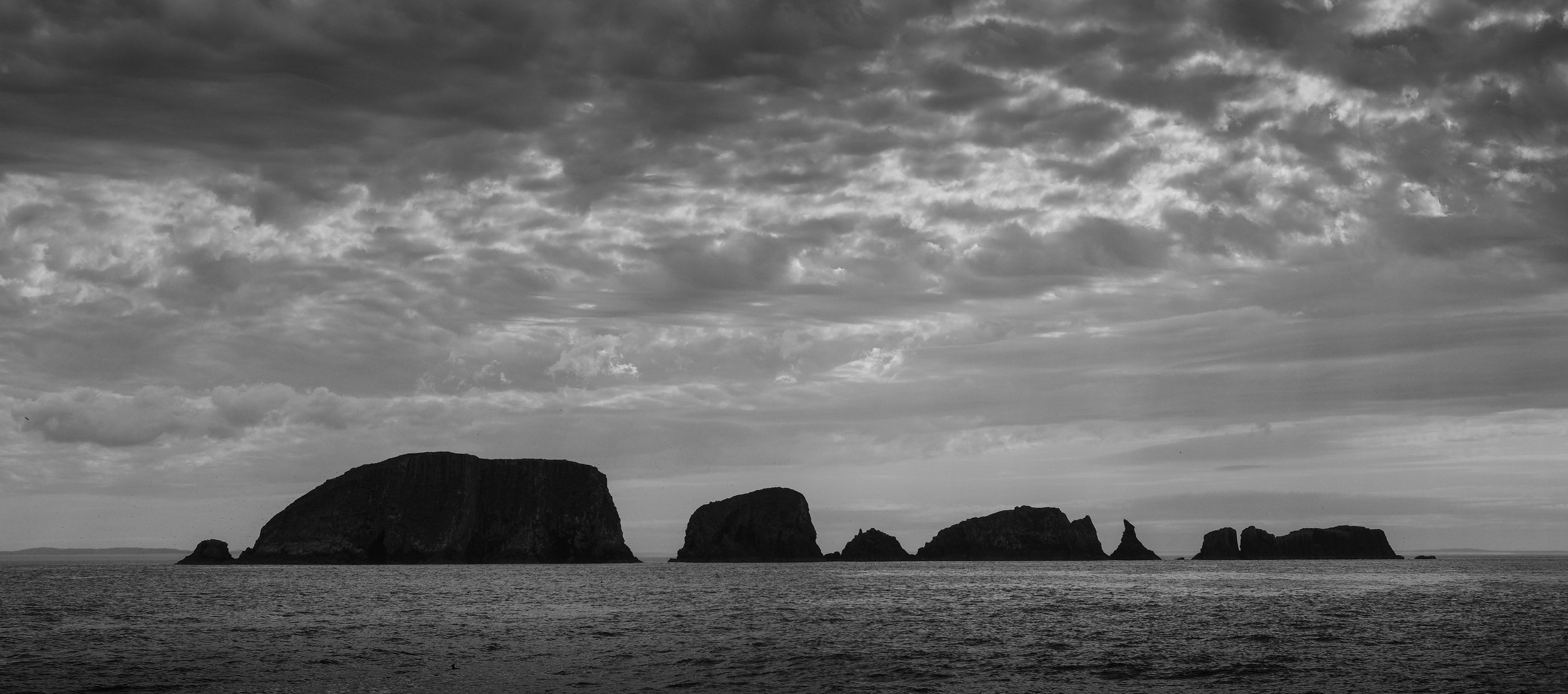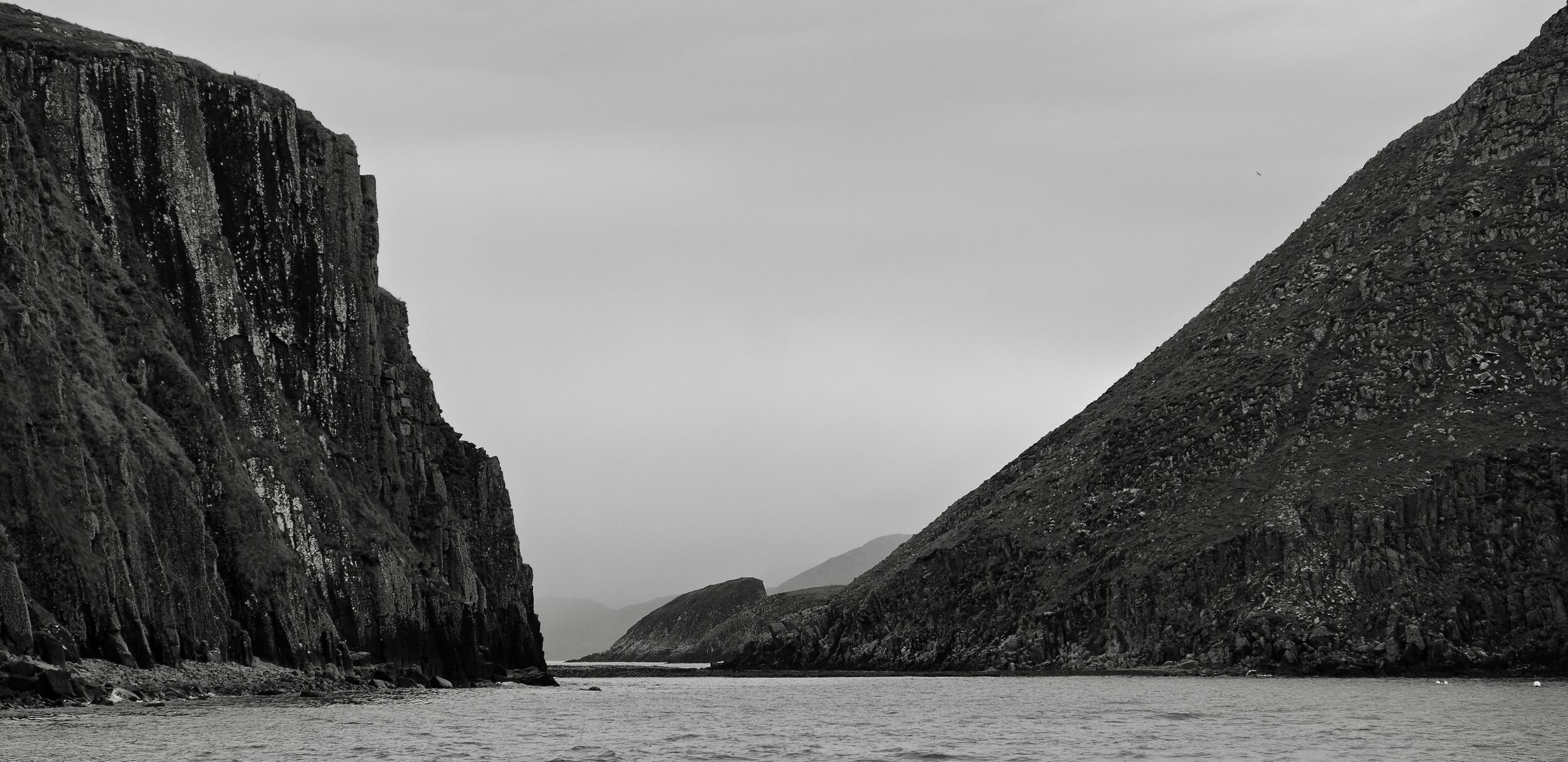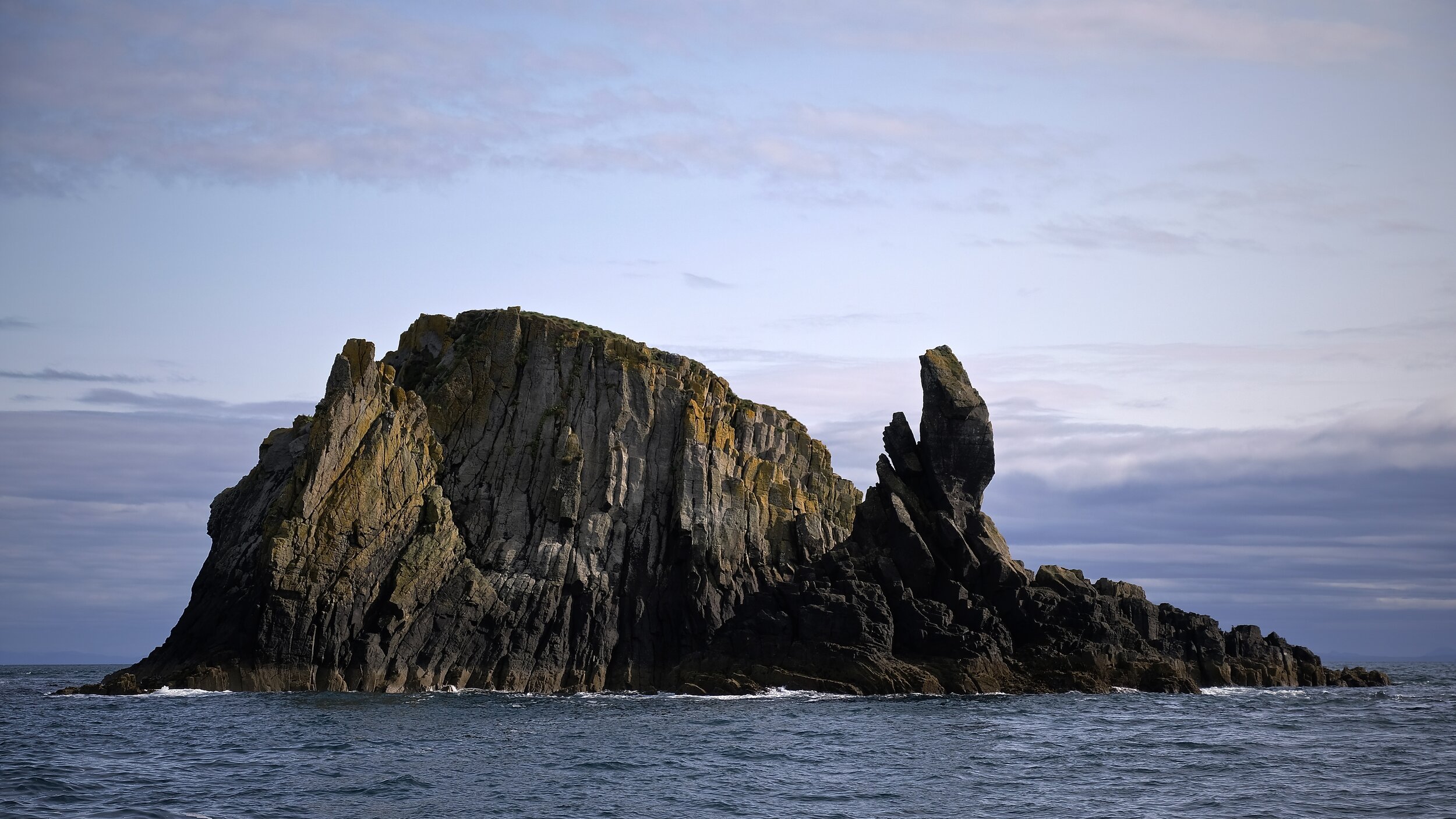perspectives
the islands from the artist’s studio on the mainland, south of Gairloch
the Galtachan…..
“There is a word in Latin, ‘palus’, which means a stake, and has given us the word ‘palisade’ or fence, but may also have helped name the line of large skerry islets, including Galta Beag, Galta Mòr, Bodach and Damhag, which guard the waters to the southwest of The Shiants. An intimidating visual barrier to seafarers, they are known in Gaelic as the “Galtachan” and the seas roundabout are notorious for their unpredictability and dangerous currents.
The etymology of the Scottish Gaelic term for these rocks seems lost in time and there is no memory of any references by people of the neighbouring Harris and Lewis, but (allowing for differences in spelling) the Galtachan may just be derived from an Irish Gaelic phrase.
The English Pale (An Ghalltacht in Irish) was that part of Ireland occupied under English rule in the late Middle Ages. Within the Pale, English was spoken and its rules prevailed. When you were ‘beyond the pale’, you were in the land of the Irish-speaking native people.
While there may never have been a literal fence to divide the two worlds, the idea of a clear separation lies at the heart of the phrase; a here, and a there.
Which seems to be appropriate, if you venture to the Shiants from Harris or Lewis, and travel ‘beyond the pale’, to reach this otherworldly place.”
R F Hood
from the pen…
Invited contributions, in verse, inspired by the islands.
“Na h’Eileanan Mòra
An ocean floor pushed against heaven,
broke the surface with its basalt bones
where the wind was from the west,
and the sunlight poured down…
…and the sea’s pride swelled,
a million years in the rising, as many more
of moonlight dragging ebb and flood behind it
meeting in a broken meniscus of land…
…where the channels ran shallow then deep
and orca arched their painted backs, white, black,
following the segmented swell as they dived
to be one with water again…
…and the waves broke their hearts on the skerries,
or rolled themselves free of the long drift, riding
home on the breath of spent, remembered storms,
riding all the green distances of the world.
”
“Seanta / Charmed
Weary mist bewitched the farther islands;
like the memory of before folding enchantment
over stone and shore and the tide rose in waves,
never still since the beginning.
My words, sifted like grains of ocean,
settled in pages as deep as the sea bed;
I read them now and see my own hand writing;
restless weather creeping from the west,
the sudden storm, rain in spates, crowding
the cliff-faces with wild descending cloud.
The only land between home and here was
the pale rise of Leodhais and these dark shapes,
a Fata Morgana bending in the heat-haze,
the torn and shifting shards of Tìr nan Og.
There, reckless upon the seabirds, time,
out of season and impetuous in its arrival,
chased the rock ledges with unkind anger,
cut into them with its eternity of knives,
spat out its rage against birth and death, railed
at the young who dared to leave their nests,
railed at all birdkind for bringing its fledglings
to the dim edge of summer and take flight.
Across the Minch, still the Blue Men waited,
their impatience wrapped in cunning, wrath held back
for the crews of those black craft whose curved hulls
lulled the sea-ways to spare their passage.
The storm-spirits bridled, mocked them with riddles,
with promises of home and return until, in silence,
the weight of darkness pressed down; entire skies
of black cloud, squalling fronts of hail, drove
those salt-skinned sailors deeper in the swell to drown,
to make them ghosts of the racing tide.
”
“Toll a’ Roimh
Igneous light finds a way between
motionless present and the time before;
between depth and darkness, shifting memory
lays down its stratigraphy of shadows.
Distorted futures scatter as we navigate,
in craft or imagination, from light to dark
to light again, invisible and blinded by both,
geology’s arched night above our heads.
We trusted history and prediction, the logic
of a journey, its beginning and end, as if
only we were the travellers and all landscapes
were stationary, static objects of our going.
As if the heft of magma, hard-grained sediment,
oceanic intrusions, had no consciousness
and we alone understood sources of light,
suns and stars, the drag of gravity…
…and how tides run and currents slip into harbours,
carrying our sorrows home again like flotsam,
leaving them un-called-for on the shore at our feet,
washing them clean, away, out to sea.
Light spills uncanny and bright
where the setting sun is hard to see;
only its edge cuts the sea in two,
cuts the basalt cliffs to sand.
One world crumbles into the next,
tomorrow’s resurrection reflected
on the surface of a sea where none of us
will be masters of its tides.
”
“Galtachan
Sea again, slick with treachery,
floods over dark slabs of geology
drags rain and mist back into itself
winds them into knotted planes of water.
A ridge beyond the islands’ shorelines
hides jagged pain in its roots, sharpened
under the gull-ledged cliffs by the rise and fall,
the promise and deceit of tides.
The old man, the bodach, scratches at hulls,
an age-worn hand over a grizzled chin,
heels them over and on toward Galta Mòr
with to the strong stacks black between.
Gobha, the blacksmith’s lad, points his anvil
a last, low skerry, as sharp as fate, boils
the wave-crests’ foam like quenched fire,
douses its metal with spray and steam.
Shards of clinker are cresting in the swell
waiting for weary sailors to break them,
stem to stern, keel to rigging and take them
home into the depths, sea again.
Damhag, the farthest outcrop, seethes,
safe passage beyond its stone damnation,
but just one sly gust, one wave too far,
makes all tomorrows sea again.”
“Eilean Mhuire
And Mary, if ever she was,
sinner or saint, she left her chapel,
tumbling walls a pile in the hollow
a stone’s throw above the beach.
From the sea-caves to the skerry
on the greenstone-bouldered shore
the low cliffs slope to the sea and back
across the bealach to Clan Neill Bay.
To the north, a lochan, to the south,
a summit, a sweep of green where
the grazing was good and the world
far enough away for summer at least.
Lost over the crumbling years, turf walls
were peat again and shallow pools
filled with light under the rushes, their people
taken home a long time past.
And no-one now remembers whose head bowed
in silence in the cell among the deer-grass
whose lips spoke to a god who was already sky
and breathed only the winds of the Minch.”
“Garbh Eilean
Seabirds namelessly wheel
like a dark mist under daylight,
and their cries echo like souls
in flight between the worlds.
The divided cliffs plunge blackened
and sheer beneath wilful water,
deep geometries of ancient stone,
and the thrust of continents.
Windswept, the shearwater, the tern,
gannet, puffin and petrel,
skirt the wave-tops for the touch
of salt-storm and squall;
the drowned geologies of the past:
never glimpsed; the eyes of birds:
blind to the beds of lost seas;
beings, they are, of wind and air.
Columns of rock have no face to turn
against the ruination the years pour
on round-shouldered ground,
no face except the seagulls’ staring
from their ledges into heavy weather.
So, every season grows: from egg to sky
to be lost again in the grey spray of ocean,
adrift in the wild Hebrides.
On the scarred ridges, crevassed and gullied,
living is a poor feast, an abrasion, no more,
on land or the sea below and the lowering
cloud that presses down upon it;
until, into the shallow bay, the boulder beach,
people rode up the tide with hands and eyes,
with their rough husbandry, and laid their rigs
across the island’s back, rods of cultivation.
Lazy beds, walls, breached fail dykes, faint tracks,
are faint shadows across the bent and heather,
and the enclosures of home and hadden, scant signs
of habitation, of work, of having been.
Too many here had ridden out the storms,
cut their history into the sparse sward,
and left behind the remnants of their days
in mounds of so little difference.”
“Eilean an Taighe
The house on the foreshore, itself a craft
of the flat shingle, was an upturned birlinn,
was a shelter from tempestuous wrack,
washed ashore by builders’ hands,
occupied in the long summers’ tending
on the grassed heather
on a wind-brown tide high above the lap
of the same summers’ waters,
and the deceptive shallows’ silence.
At anchor a moment distant,
a boat yawed gently, pitched slowly
like weather’s approach in the stealth of evening
as slow as the fall of a solstice night
change barely visible, dark dispelled by magic,
the shoreline, a boundary between the past
and now, a skiff’s scull short of forever…
…as if the past were alive
in the shining stones, on the beach-pebbles…
…as if nothing under the dimming cirrus sky
could ever cease to be…
…as if the air itself breathed as warm
as the day now dusked beneath leavings of cloud…
…as if tomorrow or the thought of tomorrow
would dawn in a repetition of every dawn
that came like a kindness on the sea
and pacified the memory of its wild days…
…every dawn that soothed the sun
to stillness in its rising and with its light
reflecting on the mirrored surface
the faces of everyone who ever passed
from ship to shore, from moment to moment,
among the islands where home was small
and white, like a keel above, parting the sky’s arc
with patient and forgetful time
…as if nothing mattered more
than sea and unbroken horizons
and a small white house
at the head of a beach.”
Brian Hill is a Scottish poet, writer and storyteller with decades of experience writing and performing his work throughout Scotland, and is greatly inspired by his base in Wester Ross.
“these silent stones
this spit of land
thread over sea
a fragile gateway
to monoliths
impenetrable,
battered by rages
of sea and salt winds
over millennia
trusted by the tentative,
grateful feet
of sailors, shepherds, clansmen
refuge in a storm
these silent stones,
indifferent sentinels”
the narrow spit of land which connects Eilean Tighe and Garbh Eilean
the Minch…..
[placeholder for contributions from those familiar with the seas around the Shiants, including fishermen and sailors and their experiences of the islands - to include audio, if possible…..]
from Harris and Lewis……..
[placeholder for stories from Hearach today and their reminiscences of the islands - to include audio, if possible….]
from the Mainland…….
[placeholder for stories from the mainland of this more distant perspective of the islands…..]












